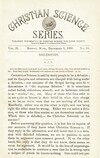

Are you sure?
This bookmark will be removed from all folders and any saved notes will be permanently removed.
Delusions
Originally published in the December 1, 1890 issue of the Christian Science Series (Vol. 2, No. 15)
And for this cause God shall send them strong delusion, that they should believe a lie: That they might be damned who believe not the truth—2 Thess 2:11, 12
Christian Science is said by many people to be a delusion; and its disciples and adherents are charged with being under a delusion,—one minister of the Gospel having seen fit to denominate it “the supreme delusion.” It is sometimes called foolish, ridiculous, absurd; and its believers referred to as “cranks,” etc., etc. Many of those who thus refer to us are quite as honest in their belief in what they charge us to be, as we in ours that we are nothing of the sort. Manifestly, either one or the other is right, and one being right the other must be wrong. Either we are under a delusion, or those who thus accuse us are themselves under one. Which then is deluded,—the Christian Scientist or his accuser?
Before answering this question, it is but fair to inquire of our accusers if they know what Christian Science is. If they reply in the affirmative, and still insist that it is a delusion with deluded followers, we are in position to meet them in argument upon common ground. If, on the other hand, the reply is that they do not know, there seems no room for argument. It would be in the line of supererogation to undertake to convince a man that he is wrong, upon a subject of which he knows nothing. One could not persuade another that the Greek language is not a great and useful language, if he had never learned the Greek alphabet or looked into a Greek Lexicon. It would be difficult to convince him that Astronomy is not a great science, if he were totally ignorant thereof. It would seem waste of time to attempt to reason him into the belief that two and two make four, if he had never taken a lesson in arithmetic,—to explain a proposition in Euclid, if he had never looked into a book of Euclid. Is not one who after severely criticising the Bible admits that he never read the Bible in his life, open to the charge of inconsistency? If he assume to tell us about the Congo country, its climate and productions, the habits and customs of the people, yet admits he has never been there—nor even read any authentic description thereof—may we not be pardoned if we decline to argue the subject with him?
Enjoy 1 free Sentinel article or audio program each month, including content from 1898 to today.
JSH Collections
This article is included in:
1890 - PAMPHLET
Christian Science Series, Vol. 2, No. 15
JSH-Online has hundreds of pamphlets, anthologies, and special editions for you to discover.


